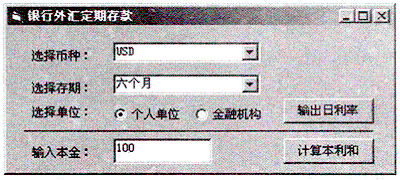[说明]
某银行新近开通外汇定期存款业务。为方便用户查询不同存款方式下的日利率、计算本利,特开发了日利率查询及本利计算程序,其运行窗口如下图所示。用户只要在界面上选择相应的存款方式(包括外汇币种、存期等),便可单击按钮一查询存款日利率。若输入一定数量的本金。程序还会根据所选择的存期计算并输出本利和。

在开发过程中,选择币种和存期的组合框(ComboBox)名分别为Combo1和Combo2,单旋钮 (CommandButton)“个人单位”和“金融机构”分别名为Option1和Option2,用于输入本金的文本框 (TextBox)名为Price,“输出日利率”和“计算本利和”按钮(CommandButton)分别名为Command1和 Command2。且已知,第i类币种、第j类存期之下,个人单位与金融机构的存款日利率分别存放于数组元素interestRate(i,j,0)和interestRate(i,j,1)中,其中i,j从0开始计数。
[Visual Basic代码]
Dim interestBate(50,10,2) As Single ’通用声明
Private Sub Form_Load()
…… ’为数组interestRate赋初值
End Sub
’根据所选择的币种、存期等信息确定日利率
Function getInterestRate()
Dim strCurrency, strTime As String, i, j, k, intDays As Integer
strCurrency = Combo1.Text
strTime = Combo2.Text
For i = 0 To Combol. ListCount - 1
If Combol.List(i) = strCurrency Then (1)
Next
For j = 0 To Combo2.ListCount - 1
IfCombo2.List(j) = strTime Then (1)
Next
If (2) =True Then
k=0
Else: k=1
End If
(3) = interestRate(i, j, k)
End Function
’输出日利率
Private Sub Commund1_Click()
MsgBox "日利率为" & getInterestRate()
End Sub
’输出本利和
Private Sub Command2_Click()
Dim strTime As String, intDays As Integer, sngCorpus, sngResult As Single
strTime = Combo2. Text
sngCorpus = CSng(Text1.Text)
(4) ’计算存款天数(以每月30天计)
Case "一个月" :intDays = 30
Case "三个月" :intDays = 90
Case "六个月" :intDays = 120
End Select
’计算并输出本利和
sngResult = sngCorpus + (5)
MsgBox "本利之和为:" & sngResult
End Sub
参考答案:(1) Exit For (2) Option1.Value (3) getInterestRate (4) Select Case strTime
(5) sngCorpus * intDays * getInterestRate()
解析: (1)此处需要查询interestRate中数组元素的下标,即组合框中所选择项的编号。因此循环遍历组合框的各项,当某项与所选项匹配时,应即刻退出循环;
(2)由于数组元素interestRate(i,j,0)对应于个人单位,即单选钮Option1被选中,其Value属性为真;
(3)函数最后需要返回日利率的值,其形式为:函数名=表达式;
(4)“Select Case表达式……End Case”是VB提供的多分支选择结构,这里需要根据用户选择的存期strTime来确定天数;
(5)此处应填入计算利息的表达式。
